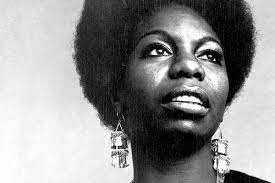Nina Simone, born Eunice Kathleen Waymon on February 21, 1933, in Tryon, North Carolina, was an iconic American singer, songwriter, pianist, and civil rights activist. Her life and music are a testament to resilience, talent, and a fierce commitment to social justice.
Growing up in the segregated South, Simone showed prodigious musical talent from an early age. She began playing piano at just three years old and displayed such remarkable skill that her community rallied to support her musical education. Despite facing racial barriers, she studied classical piano at the Juilliard School in New York City.
Simone initially aspired to become a classical pianist, but financial difficulties led her to perform in bars and nightclubs to make ends meet. It was during this time that she adopted the stage name “Nina Simone,” inspired by the nickname “Nina” given to her by a boyfriend and “Simone” after the French actress Simone Signoret.
In the late 1950s and throughout the 1960s, Simone’s career flourished as she gained recognition for her distinctive voice, extraordinary piano skills, and emotionally charged performances. She became known for blending elements of jazz, blues, gospel, and classical music, creating a style uniquely her own. Hits like “I Loves You, Porgy,” “Feeling Good,” and “Mississippi Goddam” solidified her reputation as a dynamic and influential artist.
However, Simone’s music was not limited to entertainment; it was also a powerful tool for activism. She used her platform to advocate for civil rights, addressing issues of racial injustice and inequality in songs like “To Be Young, Gifted and Black” and “Four Women.” Her involvement in the civil rights movement grew, and she became close friends with prominent figures such as Dr. Martin Luther King Jr., Malcolm X, and James Baldwin.
Simone’s activism often brought her into conflict with the establishment, and she faced personal and professional challenges as a result. Despite this, she remained steadfast in her commitment to speaking out against injustice through her music.
In later years, Nina Simone’s career took on a more eclectic path as she explored various genres and continued to captivate audiences around the world. Her influence extended beyond music, leaving an indelible mark on the cultural landscape.
Nina Simone passed away on April 21, 2003, but her legacy endures. She is remembered not only as a supremely talented musician but also as a fearless activist whose voice resonated far beyond the realm of entertainment, inspiring generations to strive for a more just and equitable society.


No responses yet